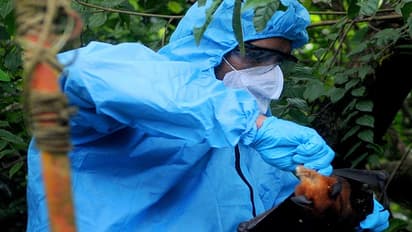Why is Nipah virus recurring in Kerala?

Synopsis
Recent Nipah virus deaths in Kerala have raised concerns about the effectiveness of the government's response. Despite initially containing the outbreak and declaring Kozhikode and Malappuram Nipah-free, new cases emerged in Ernakulam in 2019 and Chathamangalam, Kozhikode, in September 2021.
Thiruvananthapuram: Given the recent report of Nipah deaths in the state, there are growing concerns about the government's response measures. The first Nipah case in the state was confirmed in May 2018, with the virus identified in a young patient who presented with symptoms of encephalitis. Since then, the health sector in Kerala has faced unfamiliar challenges and adapted to new practices. A total of 18 people were infected, and there were 17 deaths, including that of Sister Lini.
Kerala Nipah virus death: Restrictions imposed in Malappuram; 5 wards declared containment zones
Understanding the pathways through which the virus might spread, Kerala successfully contained the outbreak and declared Kozhikode and Malappuram as Nipah-free districts on June 30, 2018. However, in 2019, the state was again alarmed by a Nipah case confirmed in Ernakulam. In September 2021, a 12-year-old boy succumbed to Nipah in Chathamangalam, Kozhikode.
In September 2023, Nipah affected six people in Kozhikode. Earlier this year, in June, a child in Pandikkad, Malappuram, died from Nipah. Months later, a new Nipah case has been reported in Malappuram again.
Despite claiming to have contained the disease, the recurring outbreaks of Nipah in Kerala raise significant questions. The reasons for the virus’s persistence in the state remain unclear, including how it spreads to humans and the nature of the virus itself. The repeated cases of Nipah indicate that Kerala’s disease surveillance may be lacking. It remains uncertain why our public health system has been unable to conduct a thorough study of the Nipah virus and establish effective preventive measures.
Antibodies to the Nipah virus have been found in bats in the areas where Nipah cases were reported. However, this does not necessarily mean that these bats are the source of the virus. There is still a need for systematic and regular surveillance of bats, which has not yet been effectively implemented. The reasons for the recurrence of the disease in Kozhikode and Malappuram remain unclear. Additionally, confirmation of Nipah cases requires waiting for test results from the Pune National Institute of Virology.
The Institute of Advanced Virology in Thonnakkal, Thiruvananthapuram, needs to be activated, and the development of the Virology Institute in Alappuzha must be completed urgently. Additionally, ensuring the availability of monoclonal antibodies for treatment and addressing other relevant issues are crucial for effectively managing future Nipah outbreaks.
Stay updated with the Breaking News Today and Latest News from across India and around the world. Get real-time updates, in-depth analysis, and comprehensive coverage of India News, World News, Indian Defence News, Kerala News, and Karnataka News. From politics to current affairs, follow every major story as it unfolds. Download the Asianet News Official App to stay informed anytime, anywhere.